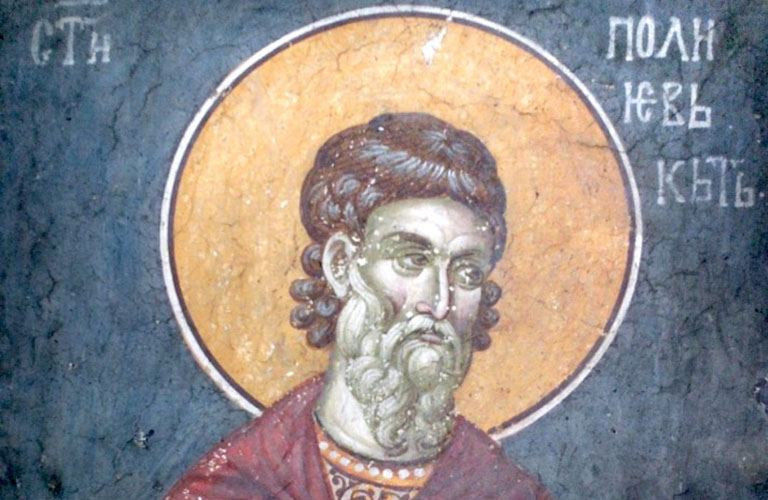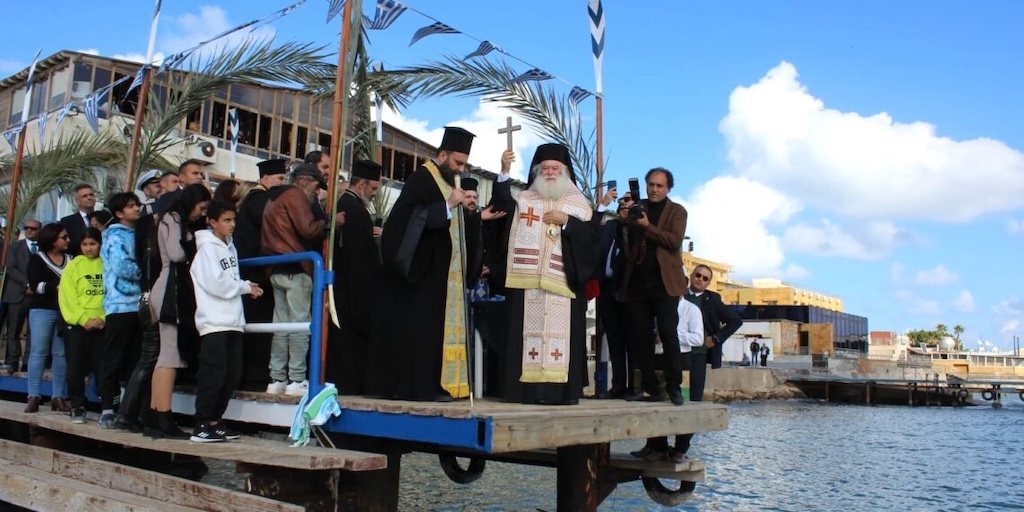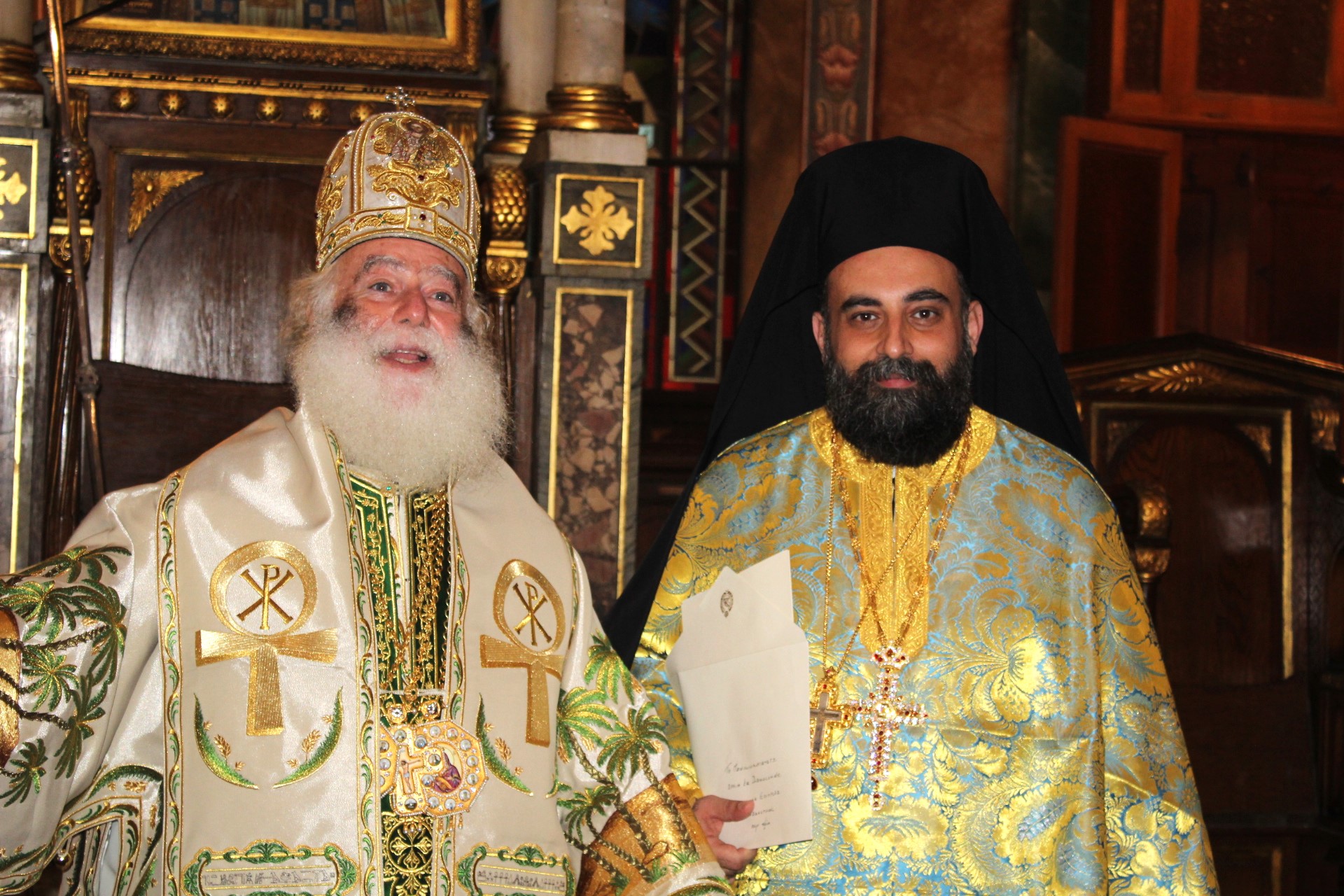Martyr Polyeuktos of Melitēnḗ in Armenia (9 January)


Saint Polyeuktos1 was the first to be martyred for Christ in the Armenian city of Melitēnḗ. He was a soldier during the reign of Emperor Decius (249-251), and he later suffered martyrdom in the reign of Valerian (253-259). He was a friend of Néarkhos (Νέαρχος) a fellow-soldier and a firm Christian. Polyeuktos, however, although he led a virtuous life, remained a pagan.
When the persecution against Christians began, Néarkhos said to Polyeuktos, “Friend, soon we shall be separated, for they will take me to torture, and you, alas, will renounce your friendship with me.” Polyeuktos told him that he had seen Christ in a dream. The Savior took his soiled military cloak from him and dressed him in a radiant garment. “Now,” he said, “I am prepared to serve the Lord Jesus Christ.”
Enflamed with zeal, Saint Polyeuktos went to the city square, and tore up the edict of Decius which required everyone to worship the idols. A few moments later, he met a procession carrying twelve idols through the streets of the city. Dashing the idols to the ground, he trampled them underfoot.
His father-in-law, the magistrate Felix, who was responsible for enforcing the imperial edict, was horrified at what Saint Polyeuktos had done and advised him to obey the imperial edict. Polyeuktos told him that we must obey God rather than men. Felix declared that Polyeuktos must die for this. “Go then, bid farewell to your wife and children,” he said. Paulina wept and urged her husband to renounce Christ. Felix also wept, but Saint Polyeuktos remained steadfast in his resolve to suffer for Christ.
Bowing his head beneath the executioner’s sword, he was baptized in his own blood. In the reign of Saint Constantine the Great, when the Church of Christ had triumphed throughout the Roman Empire, a church was built at Melitēnḗ in honor of Saint Polyeuktos. Many miracles were worked through his intercession. In that same church, the parents of Saint Euthymios the Great (January 20) prayed fervently for a son. The birth of this great luminary of Orthodoxy occurred in the year 376, through the prayers of the Holy Martyr Polyeuktos.


Saint Polyeuktos was also venerated by Saint Akakios, the Bishop of Melitēnḗ (March 31), who participated in the Third Ecumenical Council, and was a great proponent of Orthodoxy. In the East, as well as in the West, the Holy Martyr Polyeuktos is venerated as the patron Saint of vows and treaties.
The Polyeucte Overture of French composer Paul Dukas is only one of many pieces of classical music inspired by the Saints. It premiered in January of 1892. The French dramatist Pierre Corneille has also written a play, “Polyeucte” (1642), based on the Martyr’s life.
1 The name Polyeuktos means much-desired.
The Armenian city of Melitene was drenched with the blood of Christians, as was the entire country of Armenia. The first blood shed for Christ in this city was that of Saint Polyeuctus in the year 259 A.D., during the reign of Valerian. In Melitene were two friends: Nearchus and Polyeuctus. Both were officers–Nearchus baptized and Polyeuctus was unbaptized. When the command of the emperor was sent out concerning the persecution of the Christians, Nearchus prepared for death; but he was in great sorrow because he had not succeeded in converting his friend Polyeuctus to the True Faith.
When Polyeuctus learned of the reason for Nearchus’s sorrow, he promised to embrace the Faith. The following day Polyeuctus related this dream to Nearchus: the Lord Himself had appeared to him in light, removed Polyeuctus’s old clothes from him and dressed him in radiant new clothes and sat him in the saddle of a winged horse. After this, Polyeuctus went to town, shredded the emperor’s decree concerning the torturing of Christians, and destroyed many statues of idols.
He was tortured and condemned to death. When he was brought to the place of execution, he looked at Nearchus in the throng of people and joyfully cried out to him: “Save yourself, my dear friend! Remember the vow of love confirmed between the two of us!” Later, St. Nearchus died by fire as a martyr for Christ. St. Nearchus is commemorated April 22.
Saint Polyeuctus, a soldier in rank, contested during the reign of Valerian, in the year 255. He was from Melitene, a city in Armenia.
Apolytikion of Martyr Polyeuctus
Fourth Tone
Thy Martyr, O Lord, in his courageous contest for Thee received as the prize the crowns of incorruption and life from Thee, our immortal God. For since he possessed Thy strength, he cast down the tyrants and wholly destroyed the demons’ strengthless presumption. O Christ God, by his prayers, save our souls, since Thou art merciful.
Kontakion of Martyr Polyeuctus
Fourth Tone
When the Saviour bowed His head within the Jordan, there He crushed the dragons’ heads; as for His trophy-bearing Saint, when Polyeuctus head was cut off, he put to shame the deceiver and wily foe.
Source: oca.org / goarch.org / westserbdio.org




